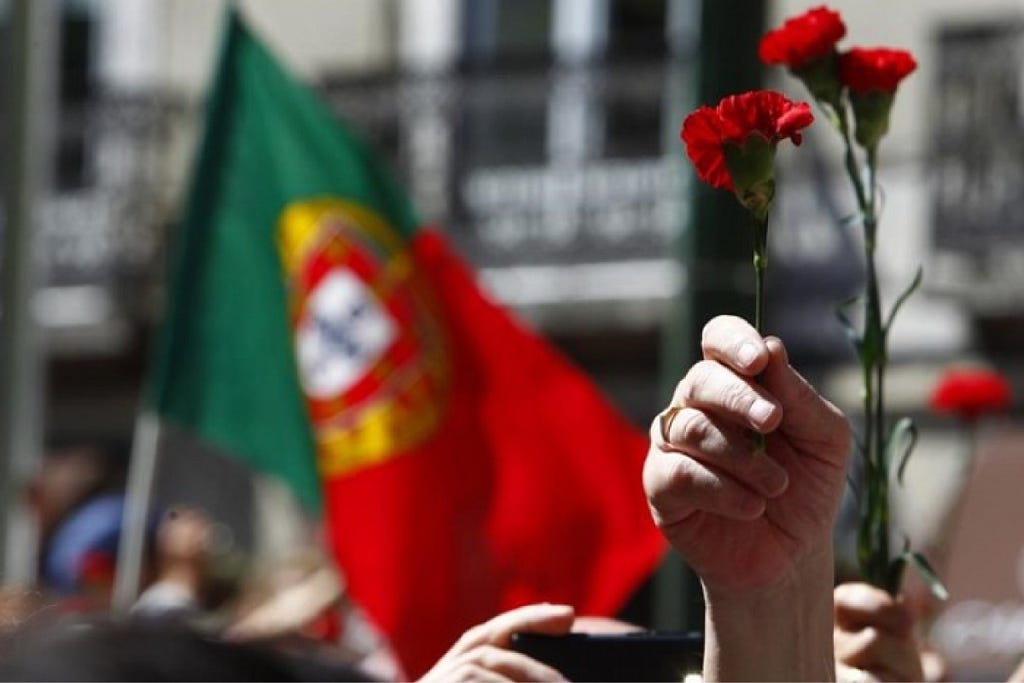- Home
- Features
- Business
- Active
- Sports
- Shop
Top Insights
April 25th in Portugal: A Legacy of Democracy and the Promise of Blockchain

April 25th holds a special significance in Portugal’s history, it marks the Carnation Revolution of 1974, a pivotal moment that brought an end to decades of dictatorship and ushered in a new era of democracy, freedom, and social progress. As we commemorate this historic event, it’s essential to reflect on the principles of democracy and transparency that underpin our society and explore innovative technologies like blockchain that have the potential to further enhance these values. In this article, we’ll delve into the legacy of April 25th in Portugal and examine how blockchain can contribute to democracy and transparency in free countries.

Remembering April 25th: A Triumph of Democracy
April 25th, 1974, stands as a testament to the power of people coming together to demand freedom, justice, and democracy. The Carnation Revolution, marked by peaceful protests and the overthrow of the authoritarian Estado Novo regime, transformed Portugal’s political landscape and paved the way for democratic governance, human rights, and social equality. This historic event serves as a reminder of the importance of safeguarding democracy and upholding the principles of transparency and accountability in government.
Challenges in Democratic Governance: Ensuring Transparency and Trust
While Portugal has made significant strides in consolidating its democratic institutions since April 25th, challenges remain in ensuring transparency, accountability, and trust in government. Issues such as corruption, and lack of transparency in decision-making processes undermine the integrity of democratic governance and erode public confidence in political institutions. In the digital age, innovative solutions are needed to address these challenges and strengthen democracy.
The Promise of Blockchain: A Tool for Transparency and Accountability
Blockchain technology holds immense promise for enhancing democracy and transparency in free countries like Portugal. By providing a tamper-proof, decentralized ledger of transactions, blockchain offers a transparent and immutable record of data that is accessible to all stakeholders. In the context of democratic governance, blockchain can be utilized to track government spending, ensuring accountability and trust in public institutions.
Blockchain in Governance: Enhancing Transparency and Accountability
Blockchain can be applied to various aspects of governance to promote transparency and accountability. For example, blockchain-based registries can be used to record government contracts, procurement transactions, and public expenditures in a transparent and auditable manner. Smart contracts powered by blockchain technology can automate and enforce the execution of government contracts, reducing the risk of corruption and ensuring compliance with regulations.
The Path Forward: Embracing Innovation for a Stronger Democracy
As we commemorate April 25th and celebrate Portugal’s journey towards democracy, it’s essential to embrace innovation and technology as tools for strengthening democratic governance. By harnessing the power of blockchain and other emerging technologies, countries can uphold the principles of transparency, accountability, and trust in government, ensuring that the legacy of April 25th endures for generations to come.
April 25th in Portugal serves as a reminder of the enduring values of democracy, freedom, and social justice. As we honor this historic event, let us also look to the future and embrace innovative solutions like blockchain to safeguard democracy, enhance transparency, and foster trust in government. By working together to harness the transformative potential of technology, we can build a more resilient, inclusive, and transparent democracy for all.
April 25th in Portugal: A Legacy of Democracy and the Promise of Blockchain was originally published in Coinmonks on Medium, where people are continuing the conversation by highlighting and responding to this story.
Recent Posts
Categories
Related Articles
BNB Chain, Cardano, and Rollblock to set alight 2025 amid claims of becoming top altcoins
BNB Chain, Cardano, and Rollblock could be set for breakouts in 2025,...
ByglobalreutersFebruary 20, 2025On-Chain Metrics Reveal The Most Critical Resistance For Bitcoin – Can BTC Break $97.5K?
Bitcoin continues to trade within a tight range, holding above the $94K...
ByglobalreutersFebruary 20, 2025Strategy announces pricing of $2B debt issuance with 35% premium
The $2B debt issuance with a 35% premium may enhance Strategy's financial...
ByglobalreutersFebruary 20, 2025Ripple And Brazilian Bank Join Forces To Launch XRP Ledger Stablecoin
Ripple and Brazilian financial heavyweight Braza Group have announced the launch of...
ByglobalreutersFebruary 20, 2025





Leave a comment